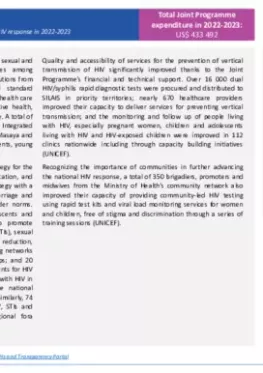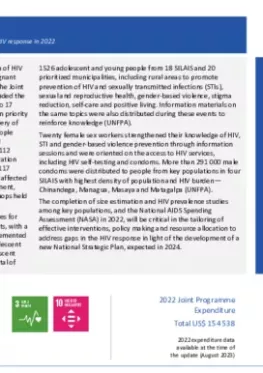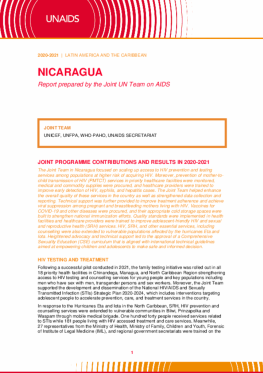|
Nicaragua
In 2022-2023, Nicaragua continued to reinforce HIV and sexual and reproductive health literacy and access to services among adolescents and young people through valuable contributions from the Joint Programme. The Government approved standard operating procedures for the delivery of comprehensive health care for adolescents, with a focus on sexual and reproductive health, which are implemented in 55 facilities across the country. A total of 250 000 condoms were donated to Local Systems of Integrated Assistance in Health (SILAIS) in Chinandega, Managua, Masaya and Matagalpa cities, prioritizing distribution among adolescents, young people and sex workers (UNFPA).
In 2023, the Ministry of Family launched a national strategy for the roll out of out-of-school comprehensive sexuality education, and 318 peer educators were trained to implement the strategy with a focus on preventing HIV, teenage pregnancy, child marriage and gender-based violence whilst promoting positive gender norms. Peer-led adolescent fora galvanized over 2300 adolescents and young people from 20 prioritized municipalities to promote prevention of HIV and sexually transmitted infections (STIs), sexual and reproductive health, gender-based violence, stigma reduction, self-care and positive living (UNFPA). Knowledge sharing networks were also established within various adolescent groups; and 20 young people living with HIV were trained as change agents for HIV prevention and advocacy for the rights of people living with HIV in their communities through a collaboration with the national network of people living with HIV (UNAIDS Secretariat). Similarly, 74 female sex workers gained deeper knowledge of HIV, STIs and gender-based violence prevention through two regional fora involving 11 SILAIS across the country (UNFPA).
Quality and accessibility of services for the prevention of vertical transmission of HIV significantly improved thanks to the Joint Programme’s financial and technical support. Over 16 000 dual HIV/syphilis rapid diagnostic tests were procured and distributed to SILAIS in priority territories; nearly 670 healthcare providers improved their capacity to deliver services for preventing vertical transmission; and the monitoring and follow up of people living with HIV, especially pregnant women, children and adolescents living with HIV and HIV-exposed children were improved in 112 clinics nationwide including through capacity building initiatives (UNICEF).
Recognizing the importance of communities in further advancing the national HIV response, a total of 350 brigadiers, promoters and midwives from the Ministry of Health’s community network also improved their capacity of providing community-led HIV testing using rapid test kits and viral load monitoring services for women and children, free of stigma and discrimination through a series of training sessions (UNICEF).




